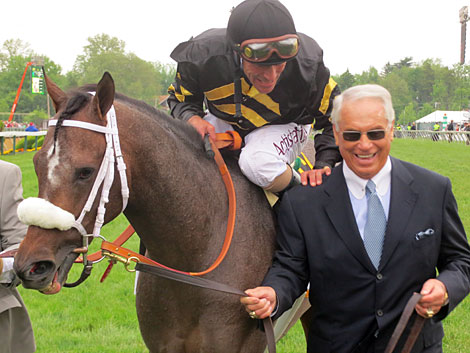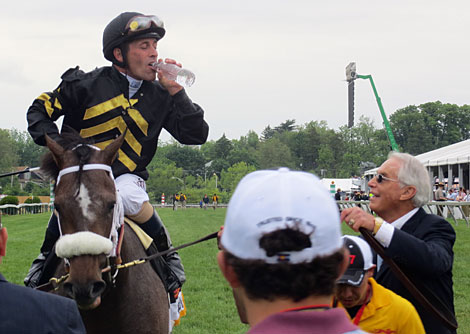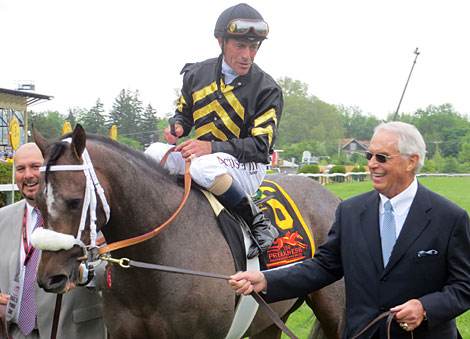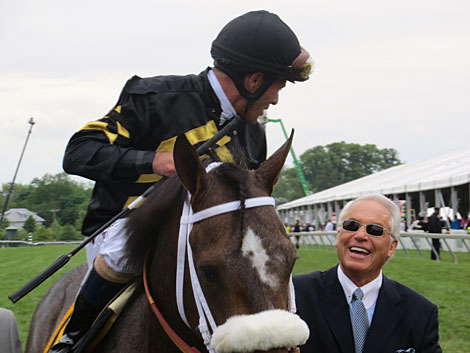Wayne Lukas knew he had pulled a fast one on his opponents and on the bettors. The Hall of Fame trainer had just sprung an 18-1 upset in the 2000 Belmont Stakes with Commendable, who was coming off a dreadful 17th-place finish in the Kentucky Derby. Despite the son of Gone West floundering through six straight out-of-the-money performances at four different racetracks at five different distances, Lukas refused to give up on the colt, whom he had purchased for Bob and Beverly Lewis for $575,000.
Not only did Commendable have no form to back him up, Lukas was attempting something that had never been done before – win the Belmont Stakes straight from the Kentucky Derby.
“Wayne, are you sure you want to do this,” Bob Lewis asked him after Lukas told him of his intentions. Even Lukas’s wife, Laura, questioned the move. “Are you sure you know what you’re doing?” she asked. “Are you being realistic here?”
But Lukas remained firm in his decision. He discussed the field and strategy with assistant trainer Mike Maker and mapped out his plan of attack. When it was over, Lukas had his 13th classic victory, and in doing so rewrote the book on how to train a horse for the Belmont. After that victory, trainers began to follow suit, resting their horses after the Derby and going straight to the Belmont. What had never been accomplished before now became the blueprint on how to win the Belmont.
Since Commendable’s victory, Empire Maker, Birdstone, Jazil, Summer Bird, and Union Rags all won the Belmont Stakes coming straight out of the Kentucky Derby.
What Lukas didn’t realize then was that his vast operation, which, for 15 years, made Triple Crown and Breeders’ Cup victories look routine, would be reduced to a single 40-50-horse stable and that it would take 13 years for his next victory in a Triple Crown race.
How fitting that it should come with a rugged throwback of a colt like Oxbow, who continues to bounce out of race after race like a fresh horse, despite having to overcome bad posts, bad trips, and premature moves? Unlike Commendable’s 18-1 odds, Oxbow was “only” 15-1 in his masterful theft of the Preakness Stakes, one of only two races since last December in which he drew a good post.
Lukas once again had silenced the doubters and proved all those wrong who thought, at age 77, he was washed up.
The year after Commendable’s Belmont Stakes victory, almost to the day, Gary Stevens, his bags packed, left the Belmont Park and headed to his car following his victory in the Belmont aboard Point Given. The cheers, the smiles, and the accolades were behind him, and all that remained were nagging thoughts of what might have been. Although he had just ridden Point Given to one of the most dominating victories in the history of the Belmont, following the colt’s impressive win the Preakness, there was a hint of sadness on his face and in his voice. Stevens knew a Triple Crown sweep had been squandered with Point Given’s inexplicable fifth-place finish in the Kentucky Derby. There was enough self blame to go around for everyone connected with the horse. And to this day, no one can provide a single concrete reason for Point Given’s Derby performance
“It’s going to be disappointing forever, knowing that racing was probably deprived of a Triple Crown winner,” Stevens said as he left the track that evening. “You have to understand, the Kentucky Derby is the ultimate for (owner Prince Ahmed Salman), and I really wanted it for him.”
Perhaps Stevens would have relished the moment and appreciated the victory more had he known, like Lukas, it would be his last victory in a Triple Crown race in 12 years.
During those dozen years, Stevens’ life was a whirlwind of conflicting emotions and a continuous attempt at self-discovery. He struggled for several years, but eventually lost his battle with pain and ventured into whatever role in racing he could find. He was involved in a horrific spill at Arlington Park that could easily have cost him his life, but he made an amazing comeback from that near-tragic incident. He lived with extreme pain in his knees before finally retiring in 2005. Over the years he briefly trained horses, was racing manager for Prince Ahmed’s The Thoroughbred Corp, was an advisor to IEAH Stables, worked as a TV analyst for several networks, and even acted in movies and television, getting excellent reviews for his roles in the film “Seabiscuit” and the short-lived TV series “Luck,” in which he played veteran washed-up jockey Ronnie Jenkins, who had turned to alcohol following a bad spill.
Following Luck’s cancellation, Stevens, remarkably, after seven years, decided to come out of retirement, as if continuing his role as Ronnie Jenkins, intent on proving to the world he still could ride with the best of them. To most everyone’s amazement, Stevens returned as strong and as fiercely competitive as he had been back in his glory days of the 1990s. He lost none of his strength and timing and his comeback was an immediate success. His fellow jockeys were amazed he could come back off such a long layoff at the age of 50 and compete at the same high level he had seven years earlier.
Stevens made several attempts to land a Triple Crown horse, but it wasn’t until he was contacted by Lukas that he found the perfect horse to match his style of riding. Give Stevens a tough, tenacious horse with excellent tactical speed who could race effectively on or just off the pace, such as a Silver Charm, In Excess, Farma Way, Bertrando, Serena’s Song, Gentlemen, Silverbulletday, Indian Charlie, General Challenge, and Congaree, and he was back in his comfort zone. His strength and ability to judge pace was second to none.
It was Lukas who helped jump start Stevens’ career 25 years earlier by putting him on his first Kentucky Derby winner, Winning Colors, who also happened to be Lukas’ first Derby winner after 12 attempts, the last 11 finishing out of the money. They would team up again in 1995, winning the Derby and Belmont with Thunder Gulch, who, at 24-1, bailed out Lukas when his favored 3-1 entry of Timber Country and Serena’s Song finished third and 16th, respectively.
Following the Derby, Lukas put Stevens back up on Serena’s Song, who he had ridden early in her career, and the daughter of Rahy proceeded to win seven of her next 10 starts, including a victory over colts in the Haskell Invitational, and five other grade I stakes.
By the end of 1995, Stevens had ridden three Eclipse Award champions for Lukas – Thunder Gulch, Serena’s Song, and Golden Attraction.
But it was Thunder Gulch who held a special place in Stevens’ heart, helping him overcome the sudden death of his close friend Mark Kauffman several days before the Kentucky Derby.
As he crossed the finish line, Stevens stood in the saddle, pointed his finger toward the heavens, and shouted, “This is for you, Mark.” After the race, he wasted no time in calling Kauffman’s wife, Molly, at her home in Mercer Island, Wash., a suburb of Seattle, to tell her Mark was with him all the way.
“What Gary did was so special and so wonderful and so spontaneous, there are no words to describe it,” an emotionally exhausted Molly said later that night. “It made me cry and it made me happy to know how much Mark was loved. We were extremely touched that Gary took time out to let us know how much he cared, and I truly believe Mark’s spirit was right there with him.”
It just seems Lukas and Stevens have always been there for each other at crucial times in their career, and it would be hard to dismiss fate as the driving force that once again brought them together this year with Oxbow. With the colt’s emotionally charged Preakness victory, each thrust the other back into the spotlight in which they had basked so often years ago. For that brief moment, Lukas no longer was 77; Stevens no longer was 50. They both were back in their prime, lifting the same trophy and commanding the same headlines. Their plaques in the National Museum of Racing’s Hall of Fame that were beginning to fade into history, once again shone with the same luster they did the day they were inducted.
Even in the Hall of Fame, they share a common bond. Stevens was inducted in 1997, the same year he won the Kentucky Derby and Preakness aboard Silver Charm. Lukas was inducted in 1999, the same year he won the Kentucky Derby and Preakness with Charismatic. Both colts were owned by Bob and Beverly Lewis.
Now, so many years later, the bond between Lukas and Stevens has grown even stronger, as each has added to the other’s already extensive list of accomplishments. Lukas, by winning the Preakness, broke “Sunny Jim” Fitzsimmons’ long-standing record of 13 classic victories, while Stevens became the only jockey other than the great Eddie Arcaro to win the Kentucky Derby, Preakness, and Belmont three times each.
Regardless of what Oxbow does in the future, the reuniting of two legends and that one special moment of sheer bliss they shared following the Preakness will remain frozen in time, forever etched in the history books.
All photos by Steve Haskin.








